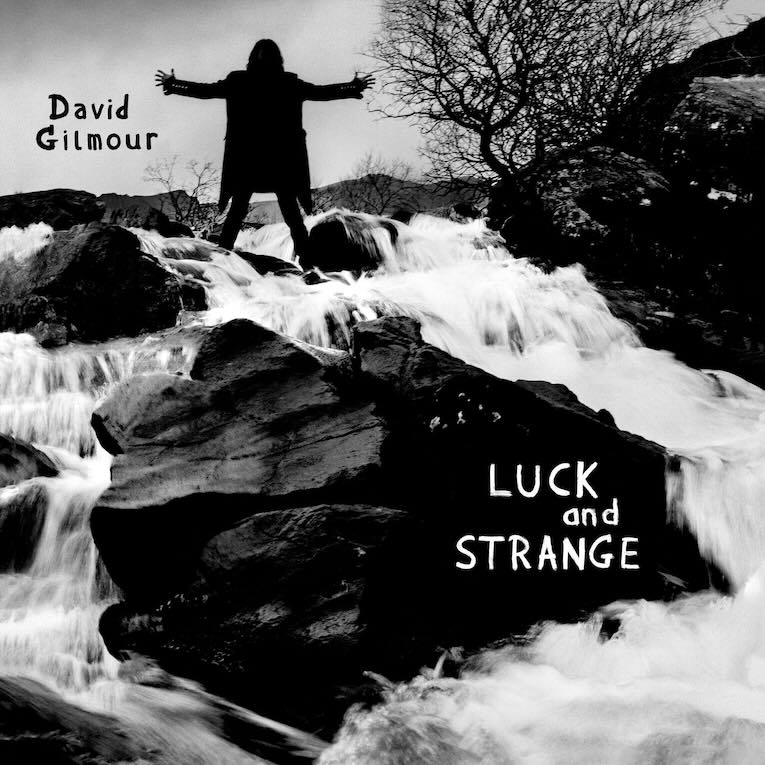
Review: David Gilmour ‘Luck and Strange’
By Hal Horowitz
As frontman for Pink Floyd after the acrimonious split with Roger Waters, guitarist/singer/songwriter David Gilmour had been synonymous with that group’s output from 1987 until 1994. A final Floyd release was cobbled together from old tapes in 2014. Gilmour though has been recording solo albums even as the band was an active concern, with 2015s striking Rattle That Lock his most recent.
It has taken nine years but he’s back with Luck and Strange (out Sept. 6), a long awaited return for anyone with even a passing interest in Pink Floyd. That’s a substantial following.
It’s quite a production, and one with a lengthy gestation. That’s confirmed by the appearance of Floyd’s late keyboardist Richard Wright, who passed in 2008. The seven minute title track, pieced together and enhanced from a longer 14-minute jam (included as a bonus), is as close to Pink Floyd as we’re likely to get going forward. Both versions are included as a memorial to Wright.
Otherwise Luck and Strange is what you’d expect from Gilmour. Eight immaculately written, atmospheric melodies (and one obscure cover) that float, weave and hover around spacey lyrics (most penned by his wife Polly Samson).
After a brief opening instrumental with just piano and guitar, the title track enters like the great lost Pink Floyd tune it sounds like. At nearly seven minutes, this is a melancholy reminiscence of innocence from Gilmour’s younger days. He sings “Quite the time to be a boy/Six-string masters of an expanding universe/It was a high time to be sure/Soaring and free from the bounds of the Earth.” It reminds us of how much we missed having Gilmour’s dryly talk/sung vocals and spiraling guitar. He follows with, “But let’s hope it’s not just luck and strange/A one-off peaceful golden age.” Amen. It ends with a two-minute class in how to play just the right notes, when to leave space between them, and how to bend those strings. Perfection.
Breathy yet compelling vocals from Romany Gilmour (yep, his daughter) on “Between Two Points” are so impressive, it’s worth wondering why she wasn’t invited in for more. At 78, Gilmour’s voice shows signs of strain but he remains a distinctive, persuasive singer and emotional guitarist. His closing solo to the track weeps, moans and cries. In other words, it’s pure Gilmour.
On “The Piper’s Call,” another rumination on life through an oblique lens (perhaps referencing Floyd’s 1967 debut album, The Piper at the Gates of Dawn) he sings “The flames are high, the piper’s call contagious/A fixer who will numb your pain and strangeness.” Gilmour begins by strumming acoustic ukulele, gradually building the mid-tempo rocker to a crashing electric slide guitar conclusion, a step removed from The Dark Side of the Moon-era Floyd.
There are hints of Mark Knopfler-styled ruminations in the exquisite, hazy ballad “Sings.” Gilmour (or more specifically his wife, who writes the lyrics), considers the years of their relationship with the touching “And behind the kitchen shelves, something’s lost there and out of sight/Young love’s photographs, growing old in black and white,” as the music undulates behind him.
At nearly eight minutes, the closing “Scattered,” yet another pensive ballad, feels like the epic it is. Gilmour plays acoustic and electric solos as full orchestration swells behind him and he warbles “Time is a tide that disobeys and it disobeys me/It never ends.”
Much of Luck and Strange could be an extended goodbye, possibly the last album David Gilmour plans on recording. If so it’s a classy, often moving, closing of the book on a legendary career that will be influential on future generations of musicians trying to figure out how Gilmour makes it look so easy.
“Dark and Velvet Nights”

Leave A Comment